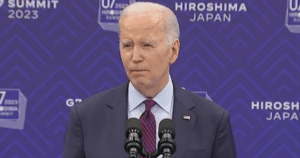Judge Grants Permission For Jan. 6 Rioter To Attend Trump Inauguration
A federal judge has granted convicted Jan. 6 rioter Eric Peterson special permission to travel to Washington, D.C. for former President Donald Trump’s upcoming inauguration.
According to the New York Post, despite Peterson’s guilty plea for his role in the Capitol breach, Judge Tanya Chutkan ruled in favor of his request, with no objections from prosecutors.
Peterson, a resident of Kansas City, Missouri, pleaded guilty on November 1, 2024, to entering and remaining in a restricted building. He faces up to one year in prison when he is sentenced on January 27, 2025. However, Peterson has been allowed to remain free on bail under strict travel restrictions. To attend the inauguration, he was required to seek permission to travel outside his allowed area.
The Jan. 20 inauguration is a ticketed event, but most people without tickets typically watch from the National Mall, where JumboTrons displays the event. Peterson’s legal team argued that he should not be restricted from attending, as he was not involved in violence or vandalism during the Capitol riot. His lawyer, Michael Bullotta, stated that Peterson was unaware of other rioters causing damage or engaging in violence.
Federal prosecutors did not oppose Peterson’s request, which allowed the judge to approve it. This decision comes amid ongoing discussions about the legal consequences for those involved in the Jan. 6 Capitol breach.
Peterson’s case is particularly notable due to his actions during the riot. He entered the Capitol building through a restricted area on the east side after other rioters had already breached the building. Video footage showed Peterson inside the Capitol, wearing a bright pink shirt, though he did not engage in the violent clashes that occurred that day.
Legal Team’s Argument and Political Context
Peterson’s lawyer, Michael Bullotta, made the case that his client should be granted permission to attend the inauguration because he was not involved in any violent acts or property damage during the Capitol riot. Bullotta also argued that Peterson did not know that others were committing such acts at the time.
Additionally, Bullotta referenced plans by the incoming Trump administration to pardon those convicted for their involvement in the Capitol riot. He suggested that Peterson’s sentencing might become irrelevant if Trump follows through on his plans to issue pardons. This argument likely influenced the judge’s decision to allow Peterson to attend the inauguration.
While Peterson’s request was granted, other rioters facing more serious charges have made similar requests to attend the inauguration. Prosecutors have opposed these requests, and rulings are still pending in those cases. The differing treatment of rioters with varying levels of involvement could become a point of public debate.
Broader Political and Legal Implications
The decision regarding Peterson’s travel to Washington, D.C. is part of a larger legal landscape surrounding the Jan. 6 Capitol riot. Recent developments, including the dismissal of charges against Trump related to election interference, have further complicated the public’s understanding of how the legal system is handling those involved in the event. Trump is also facing legal challenges in other jurisdictions, including New York and Georgia.
In Georgia, a court recently removed District Attorney Fani Willis from Trump’s case, adding another layer of complexity to the legal proceedings. The ongoing legal battles for Trump and other individuals connected to the riot highlight the challenges of prosecuting such a large and high-profile group of defendants.
The Lasting Impact of the Capitol Riot
The case of Eric Peterson is one example of how the justice system is handling individuals involved in the Jan. 6 attack. While Peterson’s role may not have included violent acts, the larger context of the Capitol riot continues to shape the way these cases are approached in the courts.
Peterson’s approval to attend the inauguration reflects the balance judges must strike between individual circumstances and the larger public interest. Although his actions on Jan. 6 were significant enough to result in a conviction, the fact that he was not directly involved in violence may have influenced the judge’s decision.
The political implications of this case are also noteworthy, as the incoming Trump administration may offer pardons to many individuals involved in the Capitol riot. If these plans come to fruition, it could change the legal outcomes for many rioters, potentially rendering their sentences moot.
The Future of Jan. 6 Rioter Cases
As the legal process continues for other Jan. 6 rioters, including those with more serious charges than Peterson, the broader public interest in these cases is unlikely to fade. The ongoing trials and sentencing decisions are likely to fuel discussions on justice, accountability, and political influence in the U.S. legal system.
Ultimately, Peterson’s case serves as an example of how the legal system must navigate the complex issues raised by the Capitol riot. Whether or not Peterson faces prison time, his case highlights the long-term consequences of the riot and how the justice system is dealing with the individuals involved.



